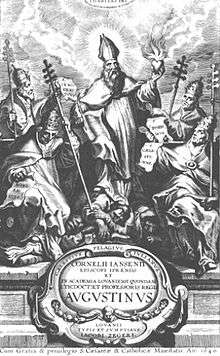Augustinus (Jansenist book)
 | |
| Author | Cornelius Jansen |
|---|---|
| Original title | Augustinus seu doctrina Sancti Augustini de humanae naturae sanitate, aegritudine, medicina adversus Pelagianos et Massilianses |
| Language | Latin |
| Subject | Pelagianism, Augustine of Hippo |
| Published | 1640 by Jacobus Zegers |
| Media type | Three volumes |
| OCLC | 174507565 |
| LC Class | BT1450 .J3 1640 |
Augustinus seu doctrina Sancti Augustini de humanae naturae sanitate, aegritudine, medicina adversus Pelagianos et Massilianses, known by its short title Augustinus, is a theological work in Latin by Cornelius Jansen. Published posthumously in Louvain by Jacobus Zegers in 1640, it was in three parts:
- On Pelagianism
- On original sin
- On divine grace
It began with the proposition that Augustine of Hippo was a man chosen by God to reveal the doctrine of grace. Thus, by this logic, any later Catholic teaching contrary to Augustine's work should be revised to match it. The text stoked the theological controversies that raged in France and much of Europe after the spread of Jansenism. Five of the books' propositions were condemned as heretical in the apostolic constitution Cum occasione promulgated in 1653 by Pope Innocent X.[1] In reaction to this condemnation, Blaise Pascal wrote his 17th and 18th Lettres provinciales in 1657. The five propositions were the focus of the Formulary Controversy, a 17th and 18th century recusancy by Jansenists of the Formula of Submission for the Jansenists.
References
- ↑
 Ott, Michael (1910). "Pope Innocent X". In Herbermann, Charles. Catholic Encyclopedia. 8. New York: Robert Appleton Company.
Ott, Michael (1910). "Pope Innocent X". In Herbermann, Charles. Catholic Encyclopedia. 8. New York: Robert Appleton Company.
Bibliography
- M. Flick and Z. Alszeghy, Antropología teológica, Ediciones Sígueme, Salamanca, 1971.
External links
- Volume 1 on Google Books (from Ghent University Library).
- Volume 2 on Google Books (from Complutense University of Madrid).
- Volume 3 on Google Books (from Complutense University of Madrid).